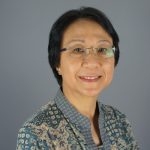Christianity is truly global. More significantly, ‘the shift of the centre of gravity of the church from the North into the South is not merely demographic. It is also reflected in the vitality and growing influence of non-western Christianity.’ This is one of the major contemporary trends in Global Christianity explained in the World Christian Encyclopedia, 3rd edition, edited by Todd Johnson and Gina Zurlo, Co-Directors of the Center for the Study of Global Christianity at Gordon-Conwell Theological Seminary.
We are thankful to have Gina and Todd contributing the first article in this issue, ‘Is Christianity Shrinking or Shifting?’, giving us a preview of some of the findings from this latest edition of the World Christian Encyclopedia. Read the article to find out the answer to that question and their reflection on what a truly global Christian family means.
Analysis of demographic trends in the world is essential to equip influencers of global mission for the task of making Jesus known to diverse groups of people. One such group belongs to Generation Z, the youngest generation in our world with distinctive characteristics. ‘But who are the Gen Zers? What are they like? And, most importantly, how can they be reached with the gospel?’. By addressing these questions, Steve Moon, Founder and CEO of Charis Institute for Intercultural Studies, helps us to understand them more deeply in his article, ‘Reaching Generation Z with the Gospel’. In his conclusion, he suggests three concrete steps by which we could progress from knowledge to action, making ‘conscious efforts to be culturally relevant in reaching Gen Z with the gospel.’
Recognizing that there are gaps between the generations, the Lausanne Movement seeks to bridge those gaps especially among global younger leaders. In 2016, a ten-year strategy of engaging with younger leaders globally was launched, called Lausanne Younger Leaders Generation (YLGen). The next article, entitled ‘Racism and the Great Commission’, is from the Lausanne YLGen Empower team. In this two-part article, we are bringing voices from across the world, featuring Caleb Davison (Missional Resources Chairman, Lausanne Movement), Richard Coleman (Cross cultural worker of TMS Global, Ethiopia), Jennifer Javed Khan (Head of Senior School, Pakistan), Rebecca Yin Foo (Clinical Psychologist and Youth Counsellor, Australia), Paul Lewis (Tertiary staff and Apologist, SCFSU Jamaica), and Susan Ann Samuel (Lawyer at the District Court, Kerala, India). They stress the importance of addressing racism and ‘how we as Christians could bring a change in response to the Great Commission of our Lord.’
Unconscious bias, whether generational, racial, or vocational, will eventually lead to conflict and division within the society and church. Jenny Taylor, a writer, journalist, and media consultant, reveals the reality of bias against journalism as a vocation in ‘The Holy Responsibility of Journalism’. Reviewing the history of journalism and Christianity, she rediscovers that in its origins, ‘journalism embodies the virtues and values’ of Christian civilization such as freedom, justice, and truth. She is calling us to embark on a mission to restore ‘public interest journalism’ by re-educating ‘ourselves about journalism as a sacrament of all that we value, if we are to seize this opportunity to redeem it, and for world-making.’
‘Christians want to change the world strategically by changing the workplace. What does that mean for persons with disabilities?’ asks Dave Deuel in ‘A Workplace For Mephibosheth’. He alerts us that only a small fraction of persons with disabilities globally are employed. Could this be another form of bias of which we are guilty? Referring to the biblical story of Mephibosheth in King David’s royal court and analyzing current workplace experiences, Dave highlights helpful lessons on ‘how we can employ people with disabilities in roles appropriate to their calling and giftedness.’ This is not an act of charity, just as ‘Mephi is not an object of pity.’ But by doing so, we are transforming the workplace culture and the world for the better.
We hope these articles will strengthen our vision for a truly diverse yet united global family in Christ.
Lausanne Global Analysis is also available in Portuguese, Spanish, and French. Please send any questions and comments about this issue to [email protected]. The next issue will be released in May 2021.

